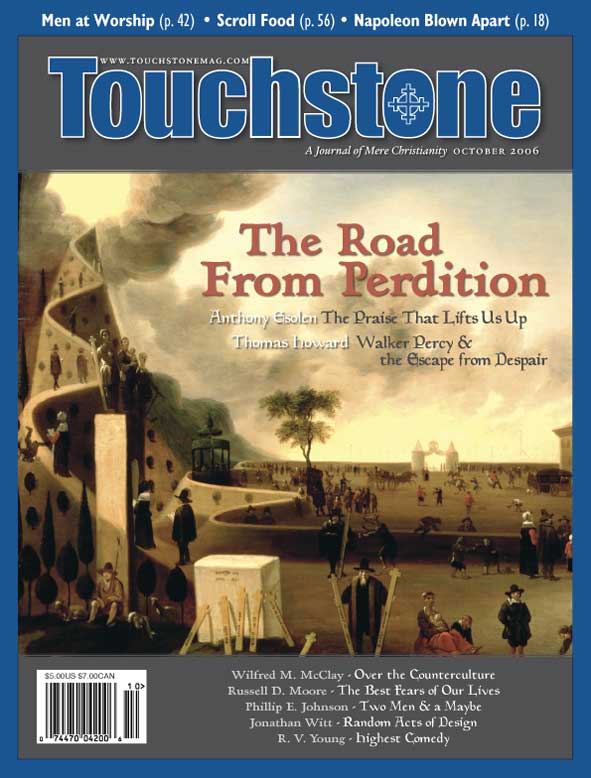Napoleon Blown Apart
Michael E. Bailey on the Pauline Aliens of Preston, Idaho
Napoleon Dynamite entered American movie theaters in 2004, having earlier garnered unexpected buzz at the Cannes Film Festival, and within a short time became a cultural phenomenon. Two years after its release, the comedy remains a perennial student film favorite as measured by the all-authoritative standard for college campus life, FaceBook, as well as by the ubiquity of “Vote for Pedro” t-shirts.
It follows the struggles of young Napoleon Dynamite, a Preston, Idaho teenager whose social ineptness at high school compounds the misery and loneliness of his wretched home life. An orphan, his family consists of his guardian grandmother, a short-tempered woman who lives a mysterious double life of fun on the sand dunes, and Kip, his unemployed 32-year-old stay-at-home brother, whose chief activity is chatting for hours “with babes” on-line.
Napoleon’s Hope
Hope enters Napoleon’s life when he befriends new classmate Pedro, an immigrant from Juarez, Mexico, and Deb, a girl who meets him while selling glamour shots door-to-door. The plot, insofar as the movie can be said to have a plot, revolves around their awkward but developing friendship as they campaign for Pedro’s improbable candidacy for school president.
Complicating matters is the overbearing Uncle Rico, who serves as guardian to Napoleon and Kip(!) when their grandmother is injured in a bizarre dune buggy accident. Uncle Rico and Napoleon clash immediately and continuously, and Uncle Rico does not hesitate to humiliate Napoleon in front of his new friends. Home is no refuge for Napoleon, and Uncle Rico’s actions threaten to undermine his friendships and only source of dignity.
At first glance, the movie’s appeal to young people is no surprise; after all, it’s a teen movie with lots of physical humor and distinctly defined characters with highly imitable voices. Yet it stays remarkably clear of most teen-movie props and clichés: It is virtually free of profanity—Napoleon says “Gosh!” and “Dang it”—and it features neither female nudity nor a randy male trying to lose it or have sex with pies.
Napoleon Dynamite is a funny teen movie, but its refusal to play by the rules of most teen movies indicates that it is not, well, just another teen movie. Certainly the bookends of the movie, which show Napoleon on two forms of transportation, suggest that something important has happened to him in between.
In the movie’s opening scene, a sullen and sighing Napoleon, wearing a wild stallion t-shirt, boards a school bus with children half his age and works his way to the back. In the movie’s closing sequence, Napoleon rides a “wild honeymoon stallion” to his brother’s wedding, looking half-like another famous Napoleon.
At the risk of elaborately describing the clothes of a perfectly naked emperor, I think that the underlying theme of Napoleon Dynamite is (though the movie was made by Mormons) consistent with the moral anthro-pology of Christianity: to show us how we become genuinely human.
The point of the movie seems to be this: “Flying solo,” that is, the individualistic pursuit of one’s own happiness apart from the good of others, culminates in misery, and the only way to grow as a human, or even to become human, is through a thick community of support, responsibility, and love. Playing by oneself, as Napoleon is wont to do at the tetherball pole, is unrewarding and pitiful.
Michael E. Bailey is Associate Professor of Government at Berry College in Mount Berry, Georgia. He serves as Deacon at First Presbyterian Church in Rome, Georgia, and is married and has three daughters.
subscription options
Order
Print/Online Subscription

Get six issues (one year) of Touchstone PLUS full online access including pdf downloads for only $39.95. That's only $3.34 per month!
Order
Online Only
Subscription

Get a one-year full-access subscription to the Touchstone online archives for only $19.95. That's only $1.66 per month!
bulk subscriptions
Order Touchstone subscriptions in bulk and save $10 per sub! Each subscription includes 6 issues of Touchstone plus full online access to touchstonemag.com—including archives, videos, and pdf downloads of recent issues for only $29.95 each! Great for churches or study groups.
Transactions will be processed on a secure server.
more from the online archives
calling all readers
Please Donate
"There are magazines worth reading but few worth saving . . . Touchstone is just such a magazine."
—Alice von Hildebrand
"Here we do not concede one square millimeter of territory to falsehood, folly, contemporary sentimentality, or fashion. We speak the truth, and let God be our judge. . . . Touchstone is the one committedly Christian conservative journal."
—Anthony Esolen, Touchstone senior editor










